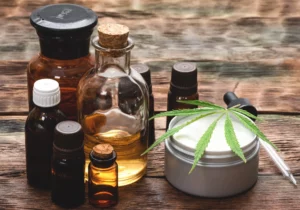Tinctures are an increasingly popular way to consume cannabis: They’re easy to dose and easy to take. The tincture’s versatility has meant that a growing number of product options are available in today’s modern cannabis market.
To manufacture cannabis products, phytocannabinoids like tetrahydrocannabinol (THC) and cannabidiol (CBD) must first be extracted from the plant. There are many different ways of doing this, each with their pros and cons, but the three most common methods involve:
- Carbon dioxide (CO2)
- Butane
- Ethanol
FOLLOW US ON FACEBOOK & INSTAGRAM
The end result of a cannabis extraction process yields a concentrate that’s the basis for many products like vapor pens, salves and—yes, you guessed it—tinctures. In traditional herbalism, tinctures are made of plant matter that’s soaked in alcohol, then strained and put in a glass dropper bottle for consumption.
In the cannabis world, tinctures can encompass this method as well as cannabis concentrates that are dissolved in a carrier liquid—be it alcohol, vegetable glycerin or oil—and then packaged in small, glass dropper bottles. These liquids serve as a vessel that THC, CBD, and other phytocannabinoids and terpenes can bind to.
Most people don’t think about the type of liquid being used in their tincture. However, this can be important information, depending on your individual needs and preferences. Following are some of the more common liquids used in cannabis tinctures as well as the pros and cons of each.
RELATED: DIY RECIPE: QUICK & EASY CANNABIS STRAIN-SPECIFIC TINCTURE
1. Alcohol-Based Cannabis Tinctures
Alcohol was likely one of the first liquids used in cannabis tinctures, dating back to the early 1900s when marijuana was a common occurrence on pharmacy shelves. Alcohol can also be used to pull phytocannabinoids from raw cannabis flower—you’ll find plenty of recipes for how to do this online. In this scenario, you usually let the flower soak in alcohol for a period of time, strain and then consume the tincture as needed.
Another method, which involves the use of laboratory equipment, involves using alcohol to extract phytocannabinoids from raw flower, then evaporating off the alcohol, leaving a concentrate. Alcohol is then mixed back into the concentrate to create a tincture. Alcohol tinctures can have a bad taste, so it’s common for producers to add honey to make products more palatable.
Alcohol-based cannabis tincture pros:
- Fast absorption rate, so effects are felt quickly
- Longer shelf life due to anti-bacterial properties of alcohol
Alcohol-based cannabis tincture cons:
- Unpleasant taste
- Not accessible to those avoiding alcohol
- No longer legal in California with the passing of adult-use marijuana
2. Vegetable Glycerin Cannabis Tinctures
Vegetable glycerin is a clear, odorless liquid that’s used in many industries. Chemically speaking, glycerin makes up the backbone of fats called triglycerides. Vegetable glycerin is made by taking these triglycerides from plant sources and breaking them down. Typical plant triglyceride sources are coconut oil, palm oil and soy. For this reason, it’s important to ask where a company sources its vegetable glycerin from, especially if you’re on a special diet or using tinctures in conjunction with a serious medical condition.
These types of tinctures can be made by soaking raw flower in vegetable glycerin or dissolving a cannabis concentrate in vegetable glycerin.
Vegetable glycerin cannabis tincture pros:
- Sweet and palatable taste
Vegetable glycerin cannabis tincture cons:
- Glycerin can’t hold as many phytocannabinoids as alcohol, so more product needed to get therapeutic effects
- Shorter shelf life than that of alcohol tinctures
- Sourcing can be questionable
3. Medium-Chain Triglyceride (MCT) Oil Cannabis Tinctures
Medium-chain triglyceride (MCT) oils are becoming quite popular in the cannabis tincture market, with top-shelf brands like Rosette Wellness touting their health benefits. MCT oil comprises saturated fatty acids, usually derived from coconut and palm oils. However, unlike most saturated fatty acids, MCTs are metabolized quickly and stored minimally as fat in the body.
Cannabinoids are fat soluble, and a few studies involving rats indicate that consuming cannabis with fats can increase the body’s absorption of THC and CBD. Basically, it’s thought that healthy fats, like MCTs, may enhance the plant’s therapeutic effects.
These types of cannabis tinctures are usually made from a cannabis concentrate that’s then dissolved in MCT oil.
MCT cannabis tincture pros:
- Easily absorbed by the liver, so effects are felt more quickly
- Evenly absorbs cannabis compounds, so dosing can be more accurate
- Neutral taste
MCT cannabis tincture cons:
- Usually lacks lauric acid, a fat that’s responsible for much of coconut oil’s benefits
- Sourcing can be questionable
4. Olive Oil Cannabis Tinctures
Olive oil can be used to extract phytocannabinoids from raw cannabis flower. Similar to the alcohol method of extraction, cannabis flower is soaked in olive oil for a period of time, strained and then consumed as needed.
One study published in the journal Cannabinoids found olive oil to be an optimal choice for extracting cannabinoids, in comparison to other solvents, like petroleum ether and naptha. When olive oil is used as a solvent, it can’t be evaporated off like alcohol, so tinctures made in this manner can’t be concentrated.
Pros of olive oil-extracted cannabis tinctures:
- Easy, cost-effective and can be made at home
- Doesn’t pull a lot of chlorophyll, leading to better taste
- Gentle extractor that can preserve terpenes, so you get a whole-plant extract
Cons of olive oil-extracted cannabis tinctures:
- Can’t be concentrated, so more is needed to get therapeutic benefits
The other way to get an olive oil-based tincture is by having a cannabis concentrate and using olive oil as a carrier oil. These types of tinctures are usually mild in taste, but the low saturated fat content of olive oil means that it can’t hold as many cannabinoids as MCT oil can.
Photo credit: Sterling College
If you’re new to cannabis and want to learn more, take a look at our Cannabis 101 post. HelloMD can help you get your medical marijuana recommendation; it’s easy, private and 100% online.






